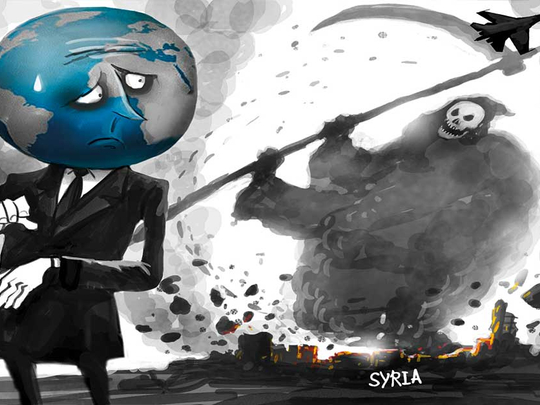
Death is raining down on Eastern Ghouta. The suburban district outside Damascus is one of the last remaining rebel enclaves near the Syrian capital. It’s been under siege for half a decade, battered by bombs and stalked by starvation. The last humanitarian convoy to arrive was in November. And now it is under relentless attack.
As my Washington Post colleagues have reported, air strikes carried out by the Syrian regime and its Russian allies have pummelled Eastern Ghouta since last week, with “circling squadrons” of jets, drones and helicopters hitting hospitals, schools and residential buildings. Many of the approximately 400,000 people still trapped in the rebel-held area are cowering in basements. Numerous medical facilities were destroyed, with doctors telling media that they now are resorting to using expired drugs to treat the many wounded.
According to human rights monitors and aid agencies, the strikes have killed more than 300 people in the space of a few days and injured hundreds more. Eastern Ghouta, it should not be forgotten, was hit in 2013 by a regime chemical-weapons strike that allegedly killed hundreds. But the current moment is potentially even more terrifying.
“We in Ghouta have been getting hit by air strikes for more than five years and this is not new to us,” a hospital director in Eastern Ghouta told CNN. “But we have never seen anything like this escalation.”
“As the pace of death accelerates in Eastern Ghouta, so do preparations,” wrote my colleague Louisa Loveluck. “Pathologists and gravediggers in the enclave said before the violence accelerated that they had 20 to 50 graves on standby at any given time. They said that was not enough.”
“We are overwhelmed,” one man said, speaking to Washington Post on the condition of anonymity. “We are throwing body parts in mass graves. It’s all we can do.”
The violence has elicited the usual international denunciations and fits of hand-wringing. Western columnists likened the killings to the war crimes at Srebrenica; editorials lamented the chronic impotence of institutions such as the United Nations.
UN Secretary General Antonio Guterres described the situation in Eastern Ghouta as “hell on earth” and, once more, urged a cessation of hostilities. “My appeal to all those involved is for an immediate suspension of all war activities in Eastern Ghouta, allowing for humanitarian aid to reach all those in need,” Guterres said, adding, “I believe Eastern Ghouta cannot wait.”
But it certainly will. Russian Foreign Minister Sergei Lavrov shrugged off calls for a truce, saying that “the fight against terrorism cannot be restricted by anything.” Authorities in Damascus played down the suffering of their countrymen, claiming that rebel groups were using civilians as “human shields.”
Indeed, this may be only the beginning of a more intense onslaught against East Ghouta as the regime of President Bashar Al Assad launched a final offensive. In the past week, ground reinforcements have been massing along the outskirts of the suburb under the command of one of Al Assad’s top generals. The regime views the Islamist rebel groups occupying the enclave as terrorists. Sana, the Syrian state news agency, said dozens of rockets and mortar rounds fired in the past two days by these factions hit various neighbourhoods in Damascus, killing more than a dozen people.
The scenario is similar to the regime’s slow, destructive reconquest in 2016 of rebel-held areas in Aleppo. At the time, both Syrian and Russian officials hailed the “liberation” of the city from Islamist radicals and trumpeted their efforts to evacuate civilians and deliver humanitarian aid. But then, as now, footage and photos from inside the besieged areas told a different story — of neighbourhoods laid to waste, whole families wiped out, and wounded children, rescued from the rubble, sitting mute and alone.
“What’s the goal? Is it to crush Ghouta on the heads of everyone like they crushed Aleppo?” Osama Nasser, a veteran anti-government activist, asked my colleagues.
For now, the focus remains on the desperate struggle for survival of those caught in the crossfire.
“There have been many massacres,” Huda Kyayati, a relief worker with the Syrian nonprofit group Women Now for Development, said to Loveluck. “I cannot handle the idea of going down to the basement because I cannot imagine what it would mean to be bombed and die under the rubble.”
“We don’t have enough ambulances left to ferry the injured, meaning many people die before they reach us,” a doctor identified as Malik told the website Middle East Eye. “The hospitals have been overflowing with blood. We are doing what we can to help, but the situation is becoming unbearable.”
“I woke up yesterday morning when all kinds of warplanes started shelling Ghouta,” Nazeer Falitani, 26, a former member of the local council, told BuzzFeed. “The shelling artillery and rocket launchers never stopped. We sit in our homes. We cannot go to the streets, and all the shops are closed. We await death in anxiety.”
Even that anxiety alone can have devastating effects. Aid groups point to spiralling rates of depression and even suicide among children and young adults trapped in the area.
“The people in Eastern Ghouta are mentally affected by the situation. Most children have seen loved ones killed, injured or disappear. This will affect their future and the way they see life. Some young people are thinking about suicide, and older people are suffering from depression. Nobody is happy,” wrote a medic in Eastern Ghouta affiliated with the International Rescue Committee.
“My family and I are living in constant stress and depression,” he continued. “Every day, I pray and hope the conflict will end. Sometimes I wish I could move away from Eastern Ghouta and live outside Syria. I really can’t imagine a good future here right now.”
— Washington Post
Ishaan Tharoor writes about foreign affairs









